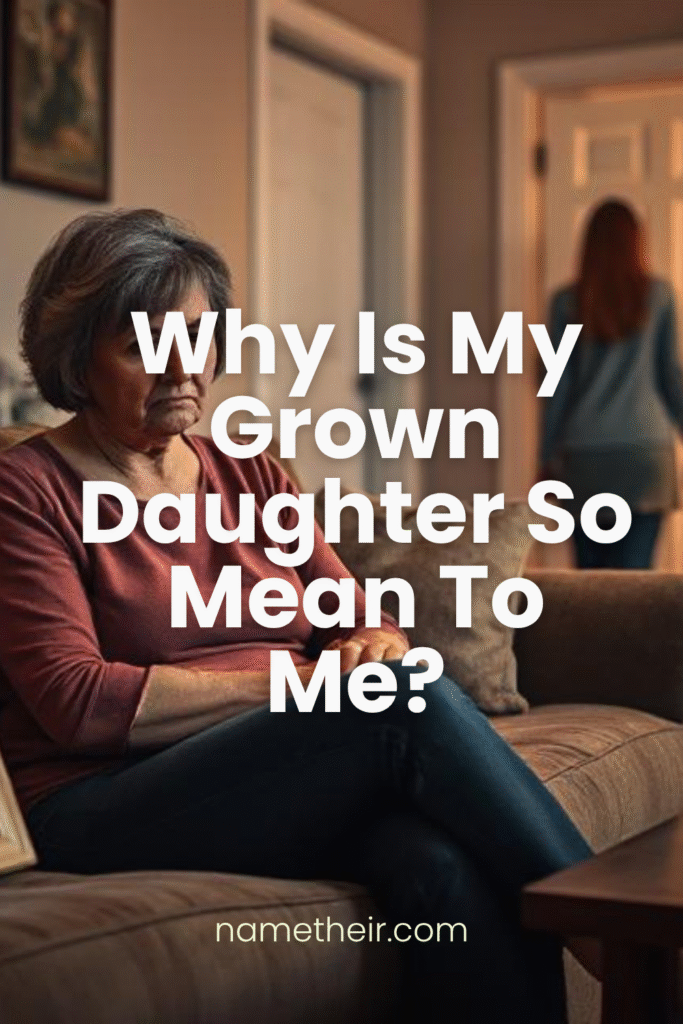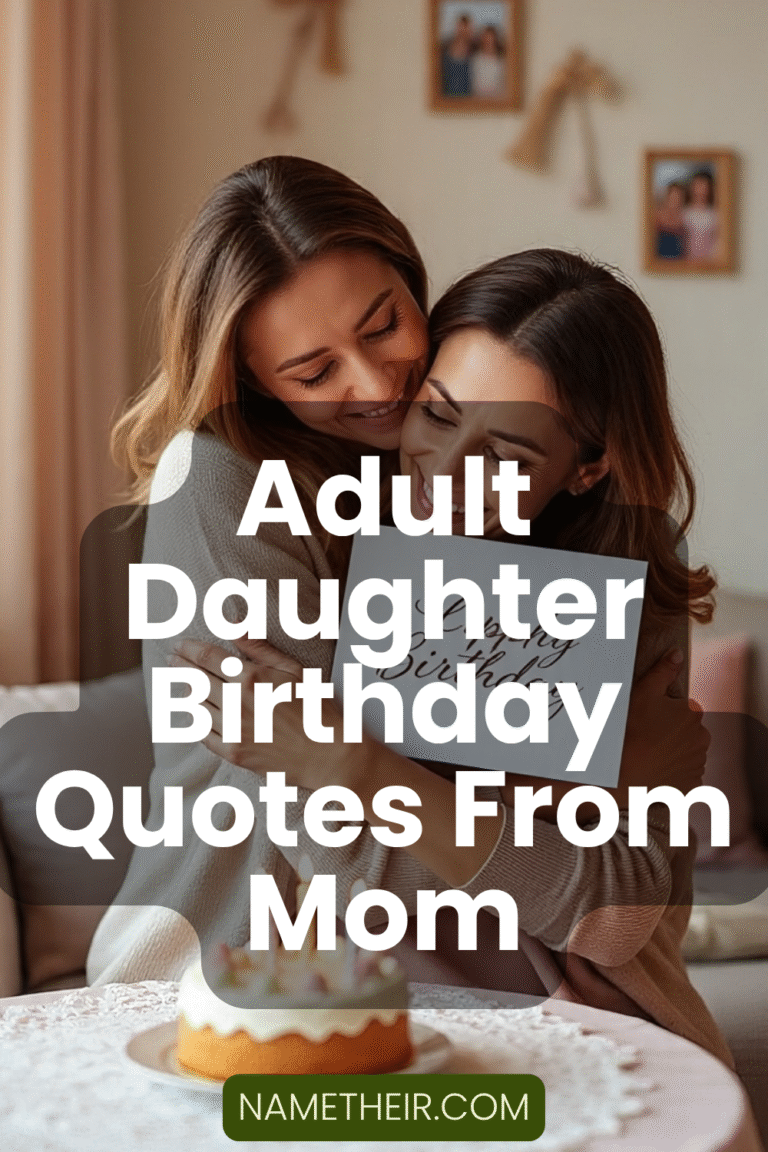Why Is My Grown Daughter So Mean To Me? Understanding, Healing, and Rebuilding the Bond
Parenthood is often described as a journey filled with love, sacrifice, and joy. But for many parents, especially mothers, this journey can also become unexpectedly painful. If you’ve ever found yourself asking, “Why is my grown daughter so mean to me?” you’re not alone. This question plagues countless parents who feel hurt, confused, and emotionally drained by the coldness or hostility of their adult daughters.
While the answer is never simple, understanding the root causes, emotional dynamics, and practical solutions can help rebuild bridges and mend relationships that feel broken. Let’s take a deep dive into what might be causing this rift, and more importantly, what you can do about it.

Table of Contents
The Pain Behind the Question
It’s one of the most heartbreaking feelings a parent can experience — raising your child with love and care, only to be met with anger, disrespect, or emotional distance once they become adults. The emotional toll can be immense. You might feel:
- Rejected by someone you devoted your life to.
- Guilty about past mistakes, even if you tried your best.
- Confused about how the relationship deteriorated.
- Lonely, especially if you expected closeness in your later years.
These feelings are valid. But the good news is that this pain can become the starting point of healing — both for you and your daughter.
Why Is My Grown Daughter So Mean To Me? Common Reasons Explained
1. Unresolved Childhood Resentment
Even if you feel you were a loving, responsible parent, your daughter may have experienced certain moments differently. Children internalize experiences in complex ways. Perhaps she felt:
- Neglected emotionally, even if her physical needs were met.
- Criticized more than encouraged.
- Compared to siblings or others unfairly.
- Pressured to succeed or behave a certain way.
As adults, these unresolved emotions can resurface as bitterness, sarcasm, or withdrawal.
2. Different Values or Lifestyles
As your daughter grows into her own identity, she may adopt beliefs, values, or lifestyles that are vastly different from yours. If she feels judged or misunderstood, she may become defensive or lash out. Even small comments like “Why don’t you settle down?” or “You should raise your kids differently” can feel like daggers if not delivered sensitively.
3. Struggles With Independence
Some daughters express meanness as a way to assert control or independence. If she feels that you’re over-involved, critical, or too emotionally dependent on her, she may use harsh words to create emotional distance.
This doesn’t make her behavior acceptable, but it does provide context.
4. Mental Health Issues
Depression, anxiety, PTSD, or unresolved trauma (not necessarily caused by you) can impact how your daughter behaves. Emotional dysregulation, irritability, and anger are often symptoms of deeper pain. In such cases, her hostility might be less about you and more about her own struggles.
5. Modeling Toxic Relationships
If your daughter witnessed unhealthy relationship dynamics — in the family, media, or her own friendships — she may have learned to express frustration through meanness or passive aggression.
It’s not necessarily personal; it’s a learned behavior.
6. Boundary Issues
Some daughters feel smothered, even when your intention is love. If boundaries were never clearly established — or constantly crossed — resentment may build over time. This is especially common when parents don’t adjust their role as their child matures into an adult.
How to Respond Without Making Things Worse
1. Pause Before Reacting
When your daughter is rude, it’s natural to want to defend yourself or fire back. But reacting emotionally often escalates the situation. Instead, take a breath. Ask yourself:
- What triggered her response?
- Is this about me, or something deeper within her?
- How can I respond with grace rather than guilt or anger?
2. Use “I” Statements
Instead of saying, “You’re always mean to me,” try:
- “I feel hurt when our conversations end in anger.”
- “I want us to have a closer relationship, but I’m not sure how.”
“I” statements reduce defensiveness and invite open communication.
3. Apologize if Necessary
If there’s something in the past that you know caused pain — even unintentionally — acknowledge it. A heartfelt apology can go a long way:
“I may not have always gotten things right, and I’m truly sorry if I made you feel unheard or unloved. That was never my intention.”
This doesn’t mean taking all the blame — it means opening the door to healing.
4. Respect Her Boundaries
Even if you feel shut out, pushing too hard will backfire. Let her know you’re available and willing to talk, but give her the space to come to you. Sometimes the best way to rebuild trust is to allow silence to work in your favor.
5. Focus on Connection Over Control
Let go of the need to be “right” or to “fix” everything. Instead, focus on maintaining a calm, consistent presence in her life — one that says: “I love you no matter what.”
What NOT to Do (If You Want to Heal the Relationship)
- Don’t guilt-trip her: Saying things like “After all I’ve done for you…” can breed resentment, not closeness.
- Don’t involve other family members as mediators: This can escalate conflict and make her feel ambushed.
- Don’t expect instant change: Emotional wounds take time to heal.
- Don’t make it all about you: While your pain is real, empathy requires listening to hers as well.
When to Seek Professional Help
If your relationship has become toxic or emotionally abusive — or if you simply don’t know how to move forward — consider seeking support from:
- A family therapist
- A life coach or counselor for parents of adult children
- Support groups for estranged parents
- Books or courses on emotional intelligence and parenting adult children
Sometimes a neutral third party can offer insights and solutions that aren’t obvious in the heat of the moment.
Rebuilding the Bond: It’s Never Too Late
Your grown daughter may be struggling in ways you can’t see. But your desire to understand and heal is a powerful first step. By choosing empathy over ego, listening over lecturing, and love over judgment, you create the environment where trust can grow again.
Remember: No relationship is perfect. But many fractured parent-daughter connections have been healed through patience, compassion, and honest dialogue.
Final Thoughts: You’re Not Alone
If you’re asking, “Why is my grown daughter so mean to me?”, know that your question is not a reflection of your failure as a parent. It’s a sign that you care deeply and want to restore what was lost. That intention alone is powerful.
Healing a relationship with an adult child takes time. But by learning, reflecting, and showing up with consistent love — even when it’s hard — you can open the door to a stronger, more meaningful connection in the future.






